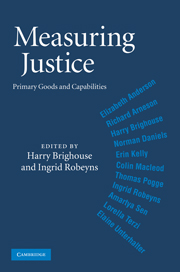Book contents
- Frontmatter
- Contents
- List of contributors
- Acknowledgments
- 1 Introduction: Social primary goods and capabilities as metrics of justice
- PART I THEORY
- PART II APPLICATIONS
- 6 Capabilities, opportunity, and health
- 7 What metric of justice for disabled people? Capability and disability
- 8 Primary goods, capabilities, and children
- 9 Education for primary goods or for capabilities?
- 10 Gender and the metric of justice
- PART III CONCLUDING ESSAY
- Index
- References
9 - Education for primary goods or for capabilities?
Published online by Cambridge University Press: 05 June 2012
- Frontmatter
- Contents
- List of contributors
- Acknowledgments
- 1 Introduction: Social primary goods and capabilities as metrics of justice
- PART I THEORY
- PART II APPLICATIONS
- 6 Capabilities, opportunity, and health
- 7 What metric of justice for disabled people? Capability and disability
- 8 Primary goods, capabilities, and children
- 9 Education for primary goods or for capabilities?
- 10 Gender and the metric of justice
- PART III CONCLUDING ESSAY
- Index
- References
Summary
Imagine that you are a newly appointed education minister for a revolutionary government. The old order is done away with and there is no significant resistance. You have, therefore, a free hand to reconstruct the education system at will. You are committed to justice, so will want to ensure that educational opportunities are distributed justly. But what should those educational opportunities consist in? In so far as it is within your power to influence their content, what theory of the metric of justice should you turn to?
Our contention in this paper is that both Rawls's social primary goods theory and Sen and Nussbaum's capabilities approach offer some resources to guide your thinking. But neither will do on its own, and even jointly they leave a good deal undetermined. We do not have alternative proposals to hand; our conclusion is the rather prosaic one that the two approaches can complement each other, but that more work needs to be done.
EDUCATION AS A PRIMARY GOOD?
Let's turn first to the social primary goods. One natural move is to say that education is a social primary good in Rawls's sense. Rawls does not say this himself, so what is the basis on which one might make the move? His theory of justice applies at the level of ideal theory and, importantly, is designed in a model which assumes that no one is chronically and severely impaired.
- Type
- Chapter
- Information
- Measuring JusticePrimary Goods and Capabilities, pp. 193 - 214Publisher: Cambridge University PressPrint publication year: 2010
References
- 25
- Cited by

